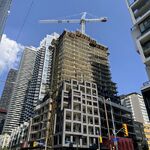Which international market locations are your referring to? Because if you compare price to income in Toronto, as compared to most cities in the world, Toronto is much more expensive. Or perhaps you are comparing the price of property in NY or London to Toronto? In which case it is an apples to orange comparison, and you could just as easily compare Toronto prices to Thunder Bay.
Well, you can't just as easily compare TO to Thunder Bay. I generally agree that comparing real estate prices is pretty difficult and bordering on meaningless in most cases, but if comparing TO to NY or London is apples-to-oranges, then comparing TO-TBay is apples-to-weathervanes.
One of the problems with price-to-income is that it doesn't take into account the real-life probablility of making a good income now. Most of northern Ontario and much of Canada looks great on paper but the probability of making a good income (or even the average) as a newcomer is next to nil, the probability of your spouse also making that is limited, likelihood of you ever making that income again if you lose your job is also nil, limited immigration and jobs means that the market for resale is limited-to-nil, the stagnancy of the market means that the quality of the available housing stock can be marginal-to-nil meaning you have to shell out well above that average house price to get a reasonably nice place. And if you lose your job the probability of selling that place at full value will then also be limited-to-nil.
The numbers only tell so much about real-time affordability, opportunity and risk.
Toronto is expensive. I'd say it is overpriced too. But everything considered, despite having lived in northern Ontario (and loving it), I'd feel much more financially secure about buying a $550k semi in Toronto than a nice $300k house in Thunder Bay or nice $200k place in Kirkland Lake or Timmins or pretty much anywhere else in Canada. Even in Hamilton, my fav city, limited secure well-paying jobs makes home ownership somewhat of a risk even at their low prices. And in that sense, TO has more in common with NY or London than most cities in Canada, although as a comparison it is still generally meaningless.
It could even be argued that Toronto isn't even the most expensive city in Canada, relative to oppotunities, services, employment, location, rent cost, etc. and I'm talking about Edm, Calg, Ottawa and not just Vanc. There are some factors that may (unfortunately) sustain higher price-to-income ratios in Toronto as compared to elsewhere in Canada - some of them national, some international, but some also local. I wouldn't discount the impact of only three meaningful transit expansions since 1980 in driving up prices of houses situated along or near subway lines.
But I'm a live-er, not an investor. And that being said, I agree that even if those factors do exist they are not a reason for continual never ending price increases (particularly in the condo market.) Toronto is still overpriced (IMHO economic, social, demographic trends mean that it's not to the extent that some think it is) however the trend will flatten, if not fall eventually. If I were an investor, I certainly wouldn't buy as an investment-only now either (which may make my post in this thread a waste!

)




